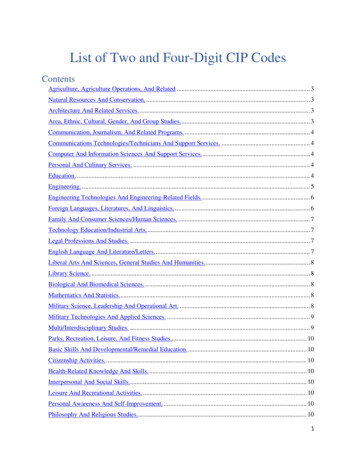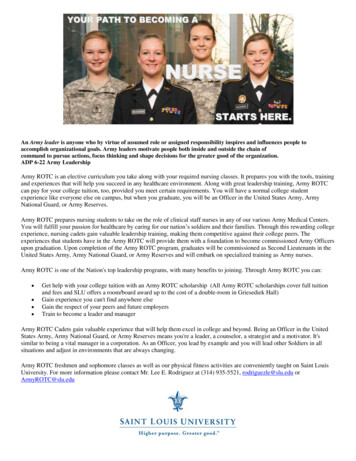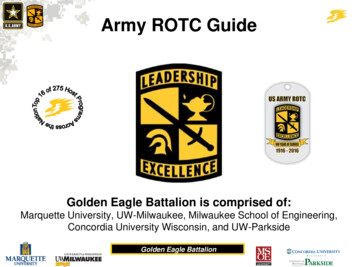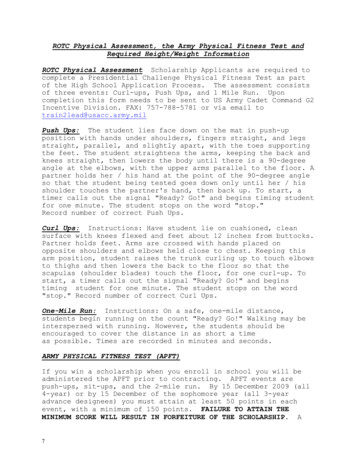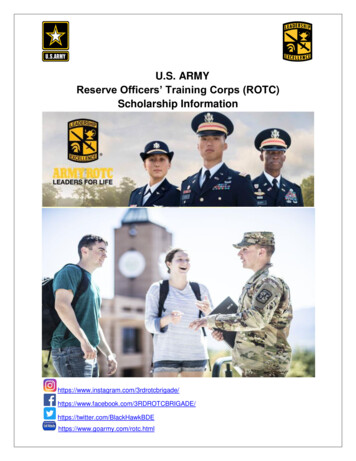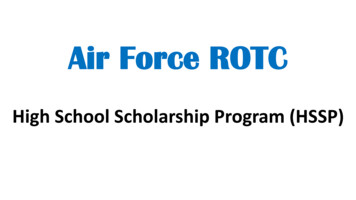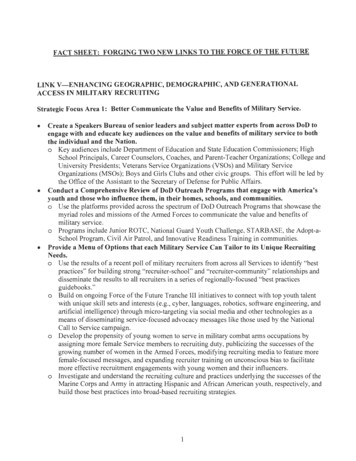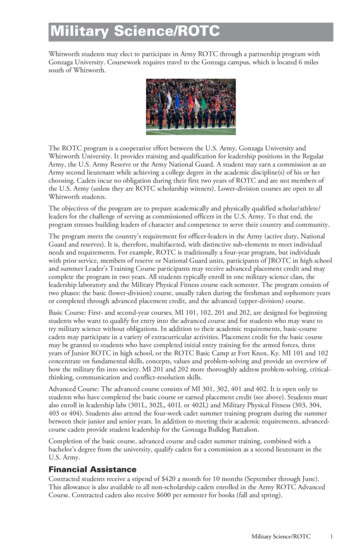
Transcription
Military Science/ROTCWhitworth students may elect to participate in Army ROTC through a partnership program withGonzaga University. Coursework requires travel to the Gonzaga campus, which is located 6 milessouth of Whitworth.The ROTC program is a cooperative effort between the U.S. Army, Gonzaga University andWhitworth University. It provides training and qualification for leadership positions in the RegularArmy, the U.S. Army Reserve or the Army National Guard. A student may earn a commission as anArmy second lieutenant while achieving a college degree in the academic discipline(s) of his or herchoosing. Cadets incur no obligation during their first two years of ROTC and are not members ofthe U.S. Army (unless they are ROTC scholarship winners). Lower-division courses are open to allWhitworth students.The objectives of the program are to prepare academically and physically qualified scholar/athlete/leaders for the challenge of serving as commissioned officers in the U.S. Army. To that end, theprogram stresses building leaders of character and competence to serve their country and community.The program meets the country’s requirement for officer-leaders in the Army (active duty, NationalGuard and reserves). It is, therefore, multifaceted, with distinctive sub-elements to meet individualneeds and requirements. For example, ROTC is traditionally a four-year program, but individualswith prior service, members of reserve or National Guard units, participants of JROTC in high schooland summer Leader's Training Course participants may receive advanced placement credit and maycomplete the program in two years. All students typically enroll in one military science class, theleadership laboratory and the Military Physical Fitness course each semester. The program consists oftwo phases: the basic (lower-division) course, usually taken during the freshman and sophomore yearsor completed through advanced placement credit, and the advanced (upper-division) course.Basic Course: First- and second-year courses, MI 101, 102, 201 and 202, are designed for beginningstudents who want to qualify for entry into the advanced course and for students who may want totry military science without obligations. In addition to their academic requirements, basic-coursecadets may participate in a variety of extracurricular activities. Placement credit for the basic coursemay be granted to students who have completed initial entry training for the armed forces, threeyears of Junior ROTC in high school, or the ROTC Basic Camp at Fort Knox, Ky. MI 101 and 102concentrate on fundamental skills, concepts, values and problem-solving and provide an overview ofhow the military fits into society. MI 201 and 202 more thoroughly address problem-solving, criticalthinking, communication and conflict-resolution skills.Advanced Course: The advanced course consists of MI 301, 302, 401 and 402. It is open only tostudents who have completed the basic course or earned placement credit (see above). Students mustalso enroll in leadership labs (301L, 302L, 401L or 402L) and Military Physical Fitness (303, 304,403 or 404). Students also attend the four-week cadet summer training program during the summerbetween their junior and senior years. In addition to meeting their academic requirements, advancedcourse cadets provide student leadership for the Gonzaga Bulldog Battalion.Completion of the basic course, advanced course and cadet summer training, combined with abachelor’s degree from the university, qualify cadets for a commission as a second lieutenant in theU.S. Army.Financial AssistanceContracted students receive a stipend of 420 a month for 10 months (September through June).This allowance is also available to all non-scholarship cadets enrolled in the Army ROTC AdvancedCourse. Contracted cadets also receive 600 per semester for books (fall and spring).Military Science/ROTC1
ScholarshipsFreshman- and sophomore-level students may compete for Army ROTC campus-based scholarships.These scholarships are applied to tuition and fees and also provide an allowance for books. Astudent need not be enrolled in ROTC to be eligible to compete for two- or three-year scholarships.No commitment to the U.S. Army is made until a scholarship is accepted, the student meets alladministrative and physical criteria, and the oath for contracting is administered. High school seniorsinterested in applying for a four-year scholarship typically submit applications by Jan. 10 of theirsenior year. More information and the application process can be found at www.goarmy.com/rotc/scholarships.html (https://www.goarmy.com/rotc/scholarships.html). Finally, there are also two-yearscholarships for students in two-year graduate programs.Fees, Uniforms and ROTC TextsA lab fee is the only fee associated with participation in the ROTC program. Uniforms andother equipment are furnished without charge. Students are responsible for, and must return, allgovernment property issued to them.Extracurricular ActivitiesColor Guard: The Gonzaga University Color Guard participates in a variety of school and civicfunctions during which precision drill or presentation of the U.S. flag is appropriate.Intramural Sports: The ROTC program sponsors teams that participate in flag football, volleyball,basketball, softball and other sports in Gonzaga and Whitworth universities' intramural leagues. Theprogram sponsors special-event teams at both Gonzaga and Whitworth and supports cadet intramuralteams as coordinated by Whitworth cadets with the professor of military science.Special Qualification Training: Advanced-course and select basic-course cadets may participate inconfidence-building courses such as Air Assault School, Airborne School, Northern Warfare TrainingCenter, and Cadet Troop Leadership Training at various military locations around the world.Note: Purchasing an annual Washington State Parks Discover Pass for classes is highly encouraged forpersonal vehicle parking for labs. Passes are 35 per year.AERO CoursesAERO 101 Heritage and Values I1AERO 101 is the first of a two-semester long sequence which composes the first half of your GeneralMilitary Course (GMC) curriculum. The goal of this course is to provide you with a foundationin team building and fundamental leadership skills. In this course, you will get a taste for what theReserve Officer Training Corp (ROTC) is and figure out whether this is the right career path for you.AERO 102 Heritage and Values II1This is the second of a two-semester long sequence which composes the first half of your GeneralMilitary Course (GMC) curriculum. The goal of this course is to provide you with a continuedfoundation in team building and fundamental leadership skills. In this course, you will get a taste forwhat the Reserve Officer Training Corp (ROTC) is and figure out whether this is the right careerpath for you.AERO 103 Leadership Laboratory II2The purpose of the LLAB program is to augment the AFROTC academic curriculum by providingprospective Air Force officers the opportunities and feedback needed to develop the leadership,managerial, and supervisory skills required of successful Air Force officers.AERO 201 Team & Leadership Fundamentals I1This is the first of a two-semester sequence which composes the second half of your General MilitaryCourse (GMC) curriculum. The goal of this course is to provide you with a foundation in teambuilding and fundamental leadership skills. In this course, we will study what it means be both leaderand follower in a military institution while improving your written and verbal communication skills.AERO 202 Team & Leadership Fundamentals II1AERO 202 is the second of a two-semester sequence which composes the second half of your GeneralMilitary Course (GMC) curriculum. The goal of this course is to provide you with a foundation inteam building and fundamental leadership skills. In this course, we will study what it means be bothleader and follower in a military institution while improving your written and verbal communicationskills.2Military Science/ROTC
AERO 203 Leadership Laboratory II2LLAB serves to complement your Aerospace Studies courses. Your goal in the classroom is to getbook smart and learn the leadership, managerial, and supervisory concepts required of successfulmilitary officers. LLAB is where you apply that knowledge in context. It's where you develop yourleadership tool kit and discover what techniques fit you best. Sometimes you'll get it wrong. Good!Capitalize on your failures and learn when the stakes are low. Fail often and fail fast, but don't fail thesame way twice.AERO 311 Leading People and Effective Communication I3Your first class in the Professional Officer Course (POC) curriculum. The goal of this course is toprovide you with foundational management and supervisory skills as you take on larger Detachmentleadership roles. As POC, you are accountable for the successes and failures of the GMC corps. Theirperformance is indicative of your ability to organize, train, and equip your subordinates to completemission objectives.AERO 312 Leading People and Effective Communication II3Concurrent enrollment in AERO 313 required. Applied leadership through supervision, mentorship,and case studies; expands on military knowledge, ethics, and communications. Cadets attend weeklyleadership laboratory.AERO 313 Leadership Laboratory III Communication II2The purpose of the LLAB program is to augment the AFROTC academic curriculum by providingprospective Air Force officers the opportunities and feedback needed to develop the leadership,managerial, and supervisory skills required of successful Air Force officers.AERO 411 National Security, Leadership, and Commissioning Preparation I3This is the first of a two-semester long sequence which makes up the second half of your ProfessionalOfficer Course (POC) curriculum. The goal of this course is to examine National Security,combatant commands, advanced leadership ethics, and Air Force Doctrine. In this course, we willstudy what it means to be a leader and follower, simultaneously, while improving your written andverbal communication skills.AERO 412 National Security, Leadership, and Commissioning Preparation II3This is the second of a two-semester long sequence which completes your Professional Officer Course(POC) curriculum and your final AERO class before commissioning. If you haven not alreadyinternalized the significance of serving in the Profession of Arms, now is the time. In this course, wewill continue discussing National Security while enhancing your role as both a leader and followerwithin the Air Force. Additionally, significant time will be spent improving your written and verbalcommunication skills.AERO 413 Leadership Laboratory IV Communication II2LLAB serves to complement your Aerospace Studies courses. Your goal in the classroom is to getbook smart and learn the leadership, managerial, and supervisory concepts required of successfulmilitary officers. LLAB is where you apply that knowledge in context. It's where you develop yourleadership tool kit and discover what techniques fit you best. Sometimes you'll get it wrong. Good!Capitalize on your failures and learn when the stakes are low. Fail often and fail fast, but don't fail thesame way twice.MI CoursesMI 101 Foundations of Officership3Develop self-confidence and review basic life skills of fitness and communication through teamstudy and activities in basic skills, drill, physical fitness, rappelling, leadership reaction courses,team-building exercises, first aid, presentations and basic rifle marksmanship. Learn fundamentalconcepts of leadership, including organization and role of the Army, Army values, and expectedethical behavior in a profession in both classroom and outdoor laboratory environments. Weeklyrequirements: three hours for class and a required leadership lab, MI 101L, plus requiredparticipation in a minimum of three one-hour sessions for physical fitness (MI 103). Participation intwo weekend off-campus field training exercises (FTX) are also required.Military Science/ROTC3
MI 101L Leadership Lab1Open only to (and required of) students in the associated Military Science Course. Learn and practicebasic skills. Gain insight into the ROTC's advanced course in order to make an informed decisionregarding whether to apply. Build self-confidence and team-building leadership skills that can beapplied through life. Prerequisite: permission of the professor of military science.MI 102 Introduction to Tactical Leadership3Learn and apply principles of effective leading. Reinforce self-confidence though participationin physically and mentally challenging exercises with upper-division ROTC students. Developcommunication skills (including active listening and feedback skills) and examine factors thatinfluence leader and group effectiveness to improve individual performance and group interaction.Practice basic skills that underlie effective problem-solving. Examine the officer experience. Weeklyrequirements: three hours for class and a leadership lab, MI 102L, plus required participation in aminimum of three one-hour sessions for physical fitness (MI 104). Participation in two weekend offcampus field training exercises (FTX) are also required.MI 102L Leadership LabSee MI 101L.1MI 103 Military Physical-Fitness1Intensive military physical-fitness program designed to raise the level of individual physical fitnessto its highest potential with emphasis on the development of an individual fitness program and therole of exercise and fitness in one's life. Participate in and learn to lead a physical fitness program.Prerequisite: permission of the professor of military science.MI 104 Military Physical-FitnessSee MI 103.1MI 190 Directed Readings3Incorporates readings in a variety of subject areas such as military history, leadership development,basic military skills, and related topics. Prerequisite: permission of the professor of military science.MI 191 Directed ReadingsSee MI 190.3MI 201 Individual Leadership Studies3Learn and apply ethics-based leadership skills including communication, feedback, and conflictresolution that develop individual abilities and contribute to the building of effective teams of people.Develop skills in problem-solving, critical thinking, oral presentations, writing concisely, planningof events, coordination of group efforts, advanced first aid, land navigation and basic military tactics.Learn fundamentals of ROTC's Leadership Development Program. Weekly requirements: threehours for class and leadership lab, MI 201L, plus participation in a minimum of three one-hoursessions for physical fitness (MI 203), and participation in two mandatory weekend exercises.MI 201L Leadership LabSee MI 101L.1MI 202 Foundations of Tactical Leadership3Challenge current beliefs, knowledge, and skills. Prepare for the ROTC Advanced Course with anintroduction to individual and team aspects of military tactics in small-unit operations. Includesuse of radio communications, making safety assessments, movement techniques, planning for teamsafety/security, and methods of pre-execution checks. Practical exercises with upper-division ROTCstudents. Learn techniques for training others as an aspect of continued leadership development.Weekly requirements: three hours of class and a leadership lab, MI 201L, plus participation ina minimum of three one-hour sessions for physical fitness (MI 204) and participation in twomandatory weekend exercises.MI 202L Leadership LabSee MI 101L.4Military Science/ROTC1
MI 203 Military Physical FitnessSee MI 103.1MI 204 Military Physical FitnessSee MI 103.1MI 290 Directed Readings3Incorporates readings in a variety of subject areas such as leadership assessment, comparative militarysystems, basic military skills, and related topics. Prerequisite: permission of the professor of militaryscience.MI 291 Directed ReadingsSee MI 290.3MI 300 Ranger Challenge1ROTC's "varsity sport," designed to familiarize students with the tactical and technical aspects of theprofessional soldier through hands-on training. Enhance leadership traits and build teamwork skillsin an exciting and competitive atmosphere. The competition includes a 10k rucksack run in combatgear of forced march, building a one-rope bridge, a grenade assault course, rifle marksmanship,orienteering or military land navigation, a physical-fitness test, and weapons assembly. Prerequisite:permission of the professor of military science.MI 301 Adaptive Team Leadership3A series of practical opportunities to lead small groups and receive personal assessments duringexecution of leadership development program in situations of increasing complexity. Analyzemilitary missions and plan military operations using squad and small-unit battle drills and tactics andopportunities to plan and conduct training for lower-division students, both to develop skills and tofunction as vehicles for practicing leadership. Analyze the role officers played in the transition of theArmy from Vietnam to the 21st century. Weekly requirements: three hours for class and a requiredleadership lab (MI 301L) plus required participation in a minimum of three one-hour sessionsfor physical fitness, MI 303, and participation in two mandatory weekend exercises. Prerequisite:permission of the professor of military science.MI 301L Leadership Lab1Open to students in the associated military science course only. Involves leadership responsibilities forthe planning, coordination, execution and evaluation of various training activities with Basic-Coursestudents and the ROTC program. Students develop, practice and refine leadership skills by servingand being evaluated in a variety of responsible positions. Prerequisite: permission of the professor ofmilitary science.MI 302 Applied Team Leadership3Develop cadet leadership competencies. Prepare for success at Cadet Summer Training: analyzetasks, prepare written or oral guidance for team members to accomplish tasks, delegate and supervisetasks, and plan for and adapt to the unexpected while under stress. Examine importance of ethicaldecision-making in setting a positive climate that enhances team performance and accommodatessubordinate spiritual needs. Weekly requirements: three hours for class and a required leadership lab,MI 302L, plus participation in a minimum of three one-hour sessions for physical fitness (MI 304)and participation in two mandatory weekend exercises. Prerequisite: MI 301. Co-requisite: MI 302L,MI 304.MI 302L Leadership LabSee MI 301L.1MI 303 Military Physical Fitness Program1Open only to (and required of) students in MI 301, 302, 401, 402, of which this program is anintegral part. Participate in, plan and lead physical-fitness programs. Develops the physical fitnessrequired of an officer in the Army. Emphasis on the development of an individual fitness programand the role of exercise and fitness in one's life. Prerequisite: permission of the professor of militaryscience.Military Science/ROTC5
MI 304 Military Physical Fitness ProgramSee MI 303.1MI 390 Directed Readings1-3Incorporates readings in a variety of subject areas such as leadership dynamics in small units, offensiveand defensive tactics, and studies in leadership characteristics and traits. Prerequisite: permission ofthe professor of military science.MI 391 Directed ReadingsSee MI 390.3MI 395 Leadership Development & Assessment Course3A four-week leadership practicum conducted at an active Army installation. Open only to (andrequired of) students who have completed MI 301, 302. The student receives pay. Travel, lodging,and most meal costs are defrayed by the U.S. Army. The advanced-camp environment is highlystructured and demanding, stressing leadership at small-unit level under varied, challengingconditions. Individual leadership and basic skills performance are evaluated during the camp. Theleadership and skills evaluations at the camp weigh heavily in the subsequent selection process thatdetermines the type of commission and job opportunities given to the student upon graduation fromROTC and the university.MI 401 Adaptive Leadership3Plan, conduct and evaluate activities of the ROTC cadet organization. Understand and execute stafforganization, functions, and processes by articulating goals and putting plans into action to attainthem. Assess organizational cohesion and develop strategies to improve organization, including leaderresponsibilities and methods of counseling. Develop confidence in skills to lead people and manageresources, examine principles of subordinate motivation and organizational change. Apply leadershipand problem-solving principles to a complex case study/situation. Weekly requirements: three hoursfor class and a required leadership lab (MI 401L) plus participation in a minimum of three one-hoursessions for physical fitness (MI 403), and participation in two mandatory weekend exercises. Corequisite: MI 401L, MI 403 Prerequisite: MI 302 and permission of the professor of military science.MI 401L Leadership LabSee MI 301L.1MI 402 Adaptive Leadership3Examine leadership responsibilities that foster an ethical command climate. Refine counseling andmotivating techniques. Examine aspects of tradition, law, and legal aspects of decision-makingand leadership. Prepare for a future as a successful Army lieutenant by performing platoon leaderactions, analyzing the Army organization for operations from the tactical to strategic level, andassessing administrative and logistics management functions. Discuss reporting and PCS functions.Weekly requirements: three hours for class and a required leadership lab, MI 402L, plus participationin a minimum of three one-hour sessions for physical fitness (MI 404), and participation in twomandatory weekend exercises. Prerequisite: MI 401 and permission of the professor of militaryscience.MI 402L Leadership LabSee MI 301L.1MI 403 Military Physical Fitness ProgramSee MI 303.1MI 404 Military Physical Fitness ProgramSee MI 303.1MI 490 Directed ReadingsIncorporates readings in a variety of subject areas to prepare the cadet for becoming an officer.Prerequisite: permission of the professor of military science.6Military Science/ROTC1-3
MI 491 Directed ReadingsSee MI-490.3Military Science/ROTC7
Army, the U.S. Army Reserve or the Army National Guard. A student may earn a commission as an Army second lieutenant while achieving a college degree in the academic discipline(s) of his or her choosing. Cadets incur no obligation during their first two years of ROTC and are not members of the U.S. Army (unless they are ROTC scholarship winners).
